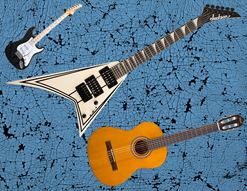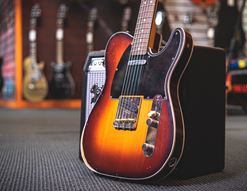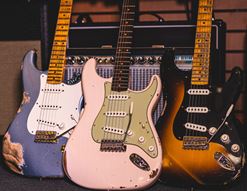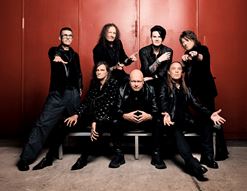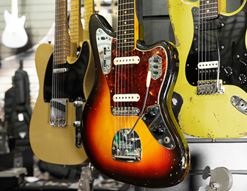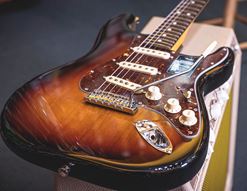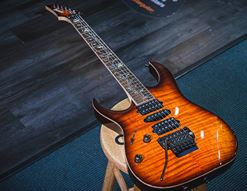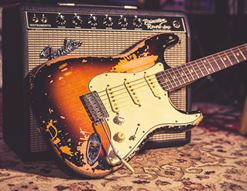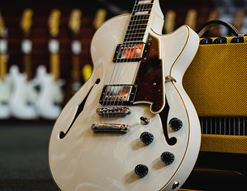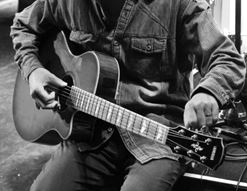How many of you listen to video game soundtracks? Even if you haven’t played the games themselves?
I do, for sure! And I’m glad I do, because I’ve encountered some of my all-time favourite music through video games.
The world of video game music is enormous, and is definitely a significant source of inspiration for many of today’s bands and artists. Whilst some people use ambient video game music to relax, study or work, just as many use this music as the very soundtracks to their lives. Video game composers are household names to these fans, who hold certain franchises as dear to their hearts as a favourite band or movie.
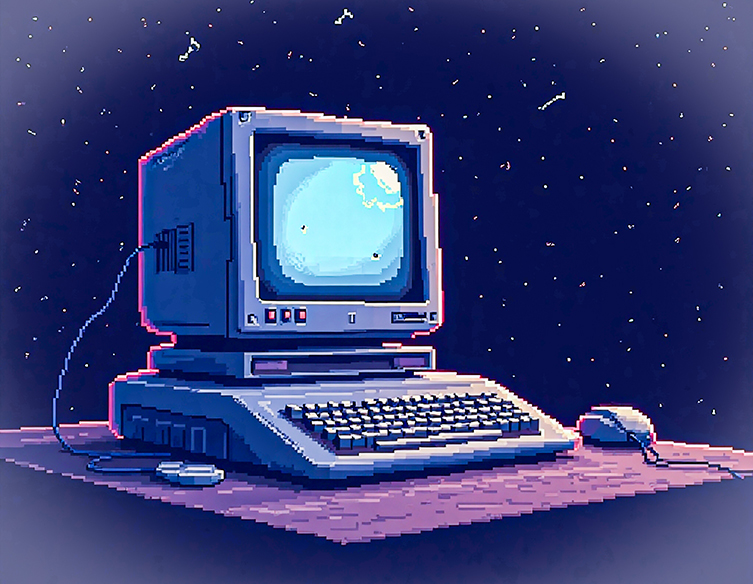
It has been this way for years, of course, but we as a culture do tend to compartmentalise things. We think of guitar music in a certain way, for example: we don’t often think of rock bands basing their sound on, say, the Zelda video games, but it happens!
Today, I’d like to offer a general (though hopefully reasonably comprehensive) look at some of the best, most influential and most game-changing video game music. Some of the entries will absolutely have guitars in them (some have LOADS) but that’s not actually a priority for me today. I want to get the point across that, as music fans first and foremost, we listen to music on all kinds of instruments, in all sorts of contexts. Video game music is as valid as band music or movie soundtracks, and today is a bit of a celebration of that idiom.
Here, then, in no particular order (I want you to discover new things today, after all!) are the greatest ever video game soundtracks…
The Games at a Glance
Monkey Island 2: LeChuck’s Revenge
Playstation Start Up Music
For anyone who owned an original Playstation, you were witness to musical greatness even before any game had started! Simply hitting the power button on top of the console brought a magical ‘cosmic key’ swirl of synth notes and bell-like percussion. It’s amazing how quickly this little sequence of notes can send us back in time within our minds, to a simpler era filled with excitement and anticipation. This is a great example of the evocative power of music right here.
For completion’s sake, the music was composed by Takafumi Fujisawa, who performed similar tasks on the PS2 and PS3 consoles too. Thanks for the memories!
Tetris
There is an entire generation of human beings out there who know the Tetris music intimately, thanks to the game being included as the free game with every Nintendo Gameboy. The Tetris theme is basically a chip-tune remake of an old Russian folk tune called Korobeiniki, which makes sense given that it was a Russian programmer, Alexay Pajitnov, who brought Tetris to the world. Korobeiniki was arranged for the Gameboy version of Tetris by composer Hirokazu Tanaka, and slightly different arrangements of the tune have been used in subsequent versions of the game.
Whether you found this game later on via the App store, or you were there when the first ‘green screen’ Gameboys featured Tetris, to know it is to love it, and to love it is to instantly start humming that addictive theme tune!
The Legend of Zelda Series
Nintendo’s other main game franchise - not the one with the Italian plumbers - The Legend of Zelda is in many ways a great method of measuring video game development in general. Here’s what I mean. Early Zelda games on the NES and Gameboy were simple 2-dimensional isometric games with text balloons and tuneful, if limited, soundtracks.
The SNES brought in greater artistic merit in both graphics and sound (the game designs themselves have always been famously involving), and then the N64 classic Zelda: Ocarina of Time defined the standard for future RPG games across the world.
Since then, Zelda titles like Breath of the Wild have cemented the franchise as an all-time great body of work. All through the series, Zelda’s heraldic, triumphant music has played as much of a part in the series’ strong identity as the characters and visuals.
Koji Kondo is the composer most responsible for the Zelda music, and his influence can be heard on the Final Fantasy and Kingdom Hearts franchises amongst many other games.
Street Fighter II
I cannot begin to explain how much pocket money I fed into the local Street Fighter II arcade machine as a kid. I half expected that, as an adult, I’d be required to beat up a car parked on a harbourside using my bare feet, but that hasn’t happened yet.
Still, I can hum at least half a dozen of Yoka Shinamura’s tunes from SFII, and perhaps even remember the corresponding in-game location (each backdrop was the home of a contender and they had their own themes) that each one appeared in. Such was the seismic effect of Street Fighter II on us kids: a cultural zeitgeist to match the Ninja Turtles! I know I’m far from the only person who remembers SFII this way, as it has become a beloved classic.
The big question is: Ryu or Ken?
Super Mario Brothers
The Mario music is of course world famous. It instantly evokes happy memories of tumbling down drainpipes and stomping on shells (?), and that goes for whichever era or platform you came to the franchise on.
Mario 64 is considered a highlight, although I’d personally cite SNES classic Super Mario World All Stars and Gameboy classic Super Mario Land 2: Six Golden Coins as my personal touchstones. Koji Kondo’s music is always jaunty, carefree and full of charm, as well as being hugely recognisable.
The original theme is actually the first piece of video game music to be preserved in the US Library registry! Ground Theme (its bizarre actual title) was chosen as “the most recognisable video game in history” and was entered into the registry alongside John Lennon’s Imagine and Led Zeppelin’s Stairway to Heaven!
Silent Hill 2
Silent Hill 2 is a great example of psychological manipulation via sound. It’s a dark and sad survival horror game which delivers different playing outcomes based on decisions taken by you during the game, a new concept back in the early 00s when the game dropped. These decisions were focused around how your player’s character interacted with other people, and how much attention was paid to certain situations, which made for a pretty unforgettable game.
Musically, Akira Yamaoka’s sound has become a bit legendary in the years since its release. The spooky, melancholic guitar twangings and synth pads were actually lifted wholesale into the 2006 movie adaptation, so effective were they at invoking that inimitable ‘Silent Hill’ vibe. Yamaoka even took a live band with him and toured the soundtrack around the world!
It’s famous for a reason, and the recent remake of the game wisely opted to change very little about the classic music.
Hollow Knight
For ethereal beauty, it’s difficult to beat the enchanting score for Team Cherry’s Hollow Knight. A ‘metroidvania’ game (an amalgam of Metroid and Castlevania, which means that it’s an open world-ish platform game with areas you return to again and again), Hollow Knight has a lyrical beauty and uncanniness that is set off beautifully by Christopher Larkin’s delicate and mesmerising soundtrack. Equal parts Tim Burton and James Newton Howard.
Rez
There are not many games whose soundtrack is as integral to the actual gaming experience as Rez. Rez came out of nowhere back in 2001, a Dreamcast game that used spectacularly retro-looking vector graphics to portray the inner workings of a computer.
You see, you play the part of a piece of software (I think) sent in to get rid of a computer virus in the most outstandingly Tron-like way possible. It really has to be seen to be believed, even all these years later, but the real kicker is that everything is done in time to a banging techno soundtrack. You line up your shots with a targeting reticule and the game pops off those shots in time with Ken Ishii’s Creation The State of the Art or Joujouka’s unstoppable Rock Is Sponge. It’s one hell of a trip to take - a genuinely synesthesic experience - and really should’ve had about 5 sequels by now! There’s nothing out there quite like Rez.
Final Fantasy VII
This is a big one. The Final Fantasy series now runs to 16 games (NOT including spin-offs), two feature length movies and a truckload of merch, but whenever people mention ‘Final Fantasy’, you know they are talking about Final Fantasy VII, the greatest of them all.
Why? Well, it was the first for the Playstation, so there was a huge step up in terms of graphics, cut-scenes and indeed the music quality. Its success was so overwhelming that decades later, a whole new generation of players are falling in love with the expansive FFVII remake that has been released after years of secretive development. It’s a cultural behemoth.
Such an iconic title has many strings to its bow, such as story, characters, dramatic moments, style, and gameplay, and the music is a major factor. Composer Nobuo Uematsu’s score is beloved by fans to the point of it being routinely performed by symphony orchestras, and recreated as piano solos. Suffice to say that the FFVII score has it all: drama, triumph, atmosphere, melancholy, romance and action. And FF fans can hum every single theme tune. Best game score ever?
Pokemon Blue/Red
Pokemon was a phenomenon like no other. Based around a Japanese cartoon but expanding far past the limits of that, the Pokemon franchise really hit home (in the first wave of fandom, at any rate) on the Gameboy. During the latter stages of the console’s active life, a pair of Pokemon games - the blue version and the red version - were released simultaneously. The idea was that you and a friend would buy one each and play together via the Gameboy’s physical game link cable.
It was a great idea, and a huge success, leading to further iterations on this theme. The game was simple but the music, composed by Junichi Masuda, was beautifully melodic and made the most of the Gameboy’s limited chipset. Is it just me or does that main opening title music sound like something Hank Marvin and The Shadows would play if they were digital computers from the future instead of besuited humans from the past?
Minecraft
Minecraft is another colourful phenomenon, on at least the same scale as Pokemon. Similarly, it’s one of those IPs that seems catered to kids but is played by tons of adults, too, so the success of the game is pretty universal!
Again, a big part of Minecraft’s charm is in the music. Composed by C418 (or Daniel Rosenfeld in real life), Minecraft’s music is a mixture of ambient and upbeat styles, with a focus on minimalism. Rosenfeld was part of the Minecraft process from the very beginning, providing sound effects as well as score music.
What’s your favourite Minecraft tune? Subwoofer Lullaby? Moog City?
Bioshock Trilogy
Bioshock is a dynamic and eccentric first-person shooter trilogy largely set in a highly imaginative underwater city called Rapture. The third installment goes completely elsewhere (into the sky) but that sense of grand madness prevails throughout.
Mystery and deception are large factors in the overall experience, which uses a blend of modern day cinematic scoring with some very specific period music to help evoke an almost-real past with amazing effectiveness. Early jazz recordings by Django Reinhardt and Stephane Grappelli populate the first two games, whilst Bioshock Infinite opts for traditional American folk music, in keeping with each storyline. It’s all wonderfully immersive, and elevates the gaming experience considerably.
Grand Theft Auto Vice City
The music of the Grand Theft Auto franchise could easily fill a blog article of its own, so successfully realised is its various chapters. Whilst GTA5 is perhaps the most diverse and realistic (with real-life celebrity guest DJs on the car radio stations), I feel that the most iconic entry to the series in terms of tunes is Vice City.
It's actually the most iconic in most ways: the 80s Florida Setting and fashions are pitch-perfect references to Miami Vice and Scarface (was Miami the most dangerous city of the 80s or what?), and the car choices - and bonkers missions - all help sketch out a fully immersive, synthwave world of crime and general poor behaviour.
But yes, the songs! The Vice City radio stations are all amazingly well-curated, and for every obvious 80s hit included (Michael Jackson’s Billie Jean) there were five less obvious but equally potent 80s anthems from the likes of ELO, The Outfield and Hall & Oates. Vice City was made with a lot of love and passion, and it shows in the details.
Elder Scrolls V: Skyrim
Skyrim has some unique combination of elements that make it somehow more loved, memorable and referenced than most other fantasy RPG’s. Maybe it’s the successful blending of exploration, story, missions and action that many similar titles struggle to achieve? Perhaps it’s the rich lore that surrounds the game world of Skyrim and greater Crydee? The cool horned helmets?
It’s surely all of those things, but it’s also largely to do with its immense score. Jeremy Soule’s vast and detailed soundtrack delivers breathless wonder, terrible danger and tranquil beauty, all in lush orchestral and choral textures.
It’s actually quite an incredible experience to ride your little horse up a mountain at midnight and quietly check out the aurora borealis soaring across the night sky whilst Skyrim’s wonderful music soundtracks the moment. It’s quite something!
If you’re me, you then find yourself quickly being arrowed and stabbed to death by rogue elves, but that’s another matter. The experience outlives the game by far.
The Music of Psygnosis
The Commodore Amiga has been sorely underrepresented in terms of gaming lore and history. One of the best games machines of the late 80s and early 90s, the Amiga also had a sound chipset that was well beyond the abilities of the PCs and Ataris of the day.
Game developers made the most out of this musical potential, and none more so than Liverpool publisher Psygnosis. Their score work for games like Shadow of the Beast II (composed by Tim & Lee Wright) and in particular, Agony (composed by Tim Wright, along with Frank Sauer) are the stuff of legend within retro gaming circles. Indeed, Amiga developers Team 17 (Cannon Fodder, Assassin, Alien Breed) and the Bitmap Brothers (Gods, Speedball 2, Xenon II Megablast) deserve entries of their own. There’s not enough space!
The Chaos Engine
I said there was no room for more Amiga music but I think we can make one exception for this title. The Bitmap Brothers’ stylish The Chaos Engine was an isometric third person shooter which mashed up anachronistic steampunk Victoriana (liberally swiped from the William Gibson & Bruce Sterling novel The Difference Engine) with massive, pounding techno music.
An unusual pairing on paper, but my goodness it was effective! The banging in-game music was written by Richard Joseph, alongside an iconic theme tune by Joi. Also, check this: Richard Joseph's score is the FIRST example of dynamic music in video game history! The better you played, the more intense the music got, and vice versa! Historically significant as well as absolutely banging!
So the Victorians had raves, then?
Stardew Valley
If I were to sum up the experience of playing this game in one word, it would be ‘wholesome’. Stardew Valley is a farming simulator that just oozes relaxing charm. Eric Barone (AKA Concerned Ape)’s music hits just the right set of whimsical notes without becoming in any way sickly: it’s like a lovely warm bath of sound.
Each season on your farm has its own distinctive music, and it all flows beautifully. The music from Stardew Valley has actually been performed by orchestras now, which is something we are seeing more of from the video game industry. More!
Clair Obscur: Expedition 33
It’s only a few months old and already people are calling Clair Obscur the game of the year. Have you checked it out yet? If so, do you love the slightly steampunk Belle Epoch aesthetic?
In terms of immersion, the team at Sandfall Interactive have certainly aced it, evoking strong flavours of French grandeur and romance throughout its emotionally intense playing experience. As for the soundtrack, Lorien Testard’s score hit the number one spot on Billboard’s Classical Music chart in May, and has also already been longlisted for Best Game Music Award in the World Soundtrack Awards.
A film adaptation has already been announced, too, so if you don’t yet know about Clair Obscur: Expedition 33, you soon will!
Bloodborne
Epic roleplaying adventures seem to be where it’s at for ominous cinematic scores. Created by Fromsoftware, those fiends who gave us the horrifically hard Dark Souls games, Bloodborne is an extremely atmospheric title that owes a stylistic debt to movies Brotherhood of the Wolf and Bram Stoker’s Dracula. Well chosen!
Bloodborne’s soundtrack is a lushly dark symphonic masterpiece, filled with low, sinister strings and brass. Six different composers worked on the music, though you’d never realise it, such is the cohesion of styles and instrumentation. There’s almost an hour and a half of orchestra and choir here, and it’s all menacingly brilliant.
A masterpiece of a game requires a masterpiece of a soundtrack. Bloodborne delivers.
Wipeout Series
Technically, I could have included the Wipeout series alongside the music of Psygnosis earlier, since that’s who published the Wipeout series. To have done that, though, would have been a serious disservice to game music. No game series deserves it’s own entry here more!
Wipeout and its sequels were the ‘wow’ games for the first Playstation: extremely fast 3D graphics (previously impossible) with real-life physics involved in the movement of the vehicles really got people’s attention back then! But that’s only half of the story. With Playstation games appearing on CDs, there was now much more space available for music, and so the Wipeout games contained up-to-the-minute soundtracks by cutting edge electronic artists. From Future Sound of London to Photek, Orbital to Fluke, each iteration of the game brought a feast to the ears as much as the eyes.
A genuinely game-changing series.
Halo
Talk about cinematic? Martin O’Donnell’s score for Xbox sci-fi shooter Halo was pitched perfectly. From the haunting choir intro theme to the in-game music that matched the on-screen action, Halo’s soundtrack was dramatic and moving, and is a deserved classic.
The original Halo game was released back in 2002, and throughout every subsequent release, those same haunting choral sounds return to bring us into that rich, colourful sci-fi world. On top of that, game soundtrack work has rarely been as perfectly matched to the screen as it is in the heart-stoppingly thrilling finale to Halo 3. The Warthog run? Yeah, I knew you’d remember!
Persona 5
In a franchise that has more than its fair share of slick style, it's the 5th installment of the Persona series that impresses the most on a musical front. The songs are created by the ATLUS Sound Team, and contain a rich mixture of styles and genre, though there’s a real cohesion to the jazz, pop and funk numbers that occur throughout the game.
ATLUS Sound Team are a group of composers who work on some of the biggest game franchises and were actually the third most-played Japanese artist played outside Japan on Spotify last year.
They are huge, and the Persona 5 soundtrack is a perfect example of why.
The Last of Us
It was surely a masterstroke to have enticed Oscar-winning composer Gustavo Santaolalla to create the score for The Last of Us. Keenly understanding the power of understatement, his concept of using pipes, percussion, found objects and ‘modern primitive folk instruments’ is not only inspired but entirely in keeping with the game’s narrative.
Importantly, Santaolalla understood the tragedy and sense of fleeting hope that travels throughout the gaming experience, and underscored it beautifully.
Cyberpunk 2077
We expect fully-realised worlds every time we step into a new game these days, but the level of immersive detail brought to us by developers CD Projekt RED for Cyberpunk 2077 remains outstanding. Yes, there were initial bugs, but now those have been sorted and we are at last able to be whomever we want to be in this alluring and all-consuming post-William Gibson techno-world of crime and opportunity.
Soundtrack-wise, it’s a wonderful melange of collaborative efforts from across the globe. Principal composers Marcin Przybylowicz and P.T. Adamczyk bring the overall palette together with propulsive, motorik beats, atmospheric pads and gated synth textures, and they are helped out by such industry talents as Dredd composer Paul Leonard-Morgan and (Hans Zimmer’s cellist) Tina Guo.
There’s a ton of great music to get through in this stylish game: two full volumes, in fact, with more in the extended DLC for the game!
Tomb Raider
In 1996, Tomb Raider brought the quiet thrill of exploring exotic locations and uncovering secret artefacts to the world like never before, with (for the time) huge worlds and cutting edge 3D graphics. Atmospheric and immersive, Tomb Raider ushered in a new wave of platform adventures.
The score, by composer Nathan McCree, beautifully echoed that sense of mythical wonder and awe, as heroine Lara Croft travelled to Egypt and Peru in search of lost relics accompanied by choirs of monks and symphonic strings. The masterstroke was in how little music was actually used, utilising it for special moments in the game only, and as a result massively heightening its effect.
For more on the Tomb Raider score, read this exclusive interview with composer Nathan McCree.
Nier Automata
I wonder if there’s a correlation between game genre and quality of music? It seems to me that many of the greatest video game soundtracks can be found within role-playing games, be they puzzle or action orientated. Who knows, but Nier Automata is another example of a great RPG with wonderful music.
The main surprise - given the frantic and explosive visuals - is in how subtle and measured much of the music is. Driven by vocals and piano for the most part, Neir Automata’s music contains a wealth of subtle details that are easy to miss. One in particular is the actual language used for the singing: it’s an invented language created by singer Emi Evans specifically for this game, called Chaos Language. It’s supposed to evoke the notion of forgotten languages, which ties in with the post-apocalyptic setting wonderfully.
Monkey Island 2: LeChuck’s Revenge
Lucasarts’ point-and-click graphic adventures are still regarded as some of the best examples of that genre, and of these, Monkey Island 2 easily sits at the top of the table. As funny, original and charming as the original Monkey Island was, the sequel upped the ante with hand-painted graphics (background art was scanned directly from the original paintings), even-more-eliptical puzzles, a double-dose of the game’s trademark humour and, best of all, a fantastic soundtrack that built on - and eclipsed - that of the excellent original.
Monkey Island 2 is a surreal and welcoming experience, shot through with top quality calypso, reggae and atmospheric tunes, all with a distinctly piratical feel.
Even better again are the remastered versions of the games which have fully re-recorded music, created by musicians playing real instruments. It’s a wonderful upgrade to Michael Land's iconic soundtrack.
Doom (2016)
Prog metal with 8 string guitars and synths? That’s how 2016’s version of Doom rolls, and wow does it suit the game! Doom was never what you’d describe as subtle - quite the opposite in fact - and so the sonics have to be able to go up against the hellish glee of the graphics and in-game carnage.
For visceral thrills and action tropes that out-do 80s Arnie movies, Doom is the premier choice. The score, by Aussie composer Mick Gordon, joins his other hard rockin’ soundtracks for shooters like Wolfenstein and LawBreakers.
Shadow of the Colossus
How many games retain that elusive feeling of mystery, even years after you’ve completed them? Truly, Shadow of the Colossus left such a mark on those who played it - either originally in 2005 or a few years ago when it was remade - that they’ve never quite been able to brush it off.
If you don’t know the game then I think it’s important not to say too much about it, but for those who have, I expect your eye skimmed this whole list just to make sure SotC was included! The soundtrack is wondrous, created with a symphonic feel but a cinematic flow. The use of voices was, back then at least, quite an under-utilised aspect, blended with flutes and sparkling hand-percussion to evoke a New Age feel with the grandiosity of a movie soundtrack - and just a touch of mid 80s Tangerine Dream (or is that just me?)
Nowadays, you can hear the influence of the SotC soundtrack everywhere. A special - and quite emotionally affecting - gaming experience is matched by the wonder and desolate beauty of the score.
A Wonderful World for Music
Video games have proven themselves to be a rich and fertile land for music. There’s so much scope and potential for stylistic innovation, juxtaposition and innovation, whether the music is ambient or attention-grabbing.
What’s really interesting to me is that advances in technology have allowed game music to be more ‘realistic’ than ever (as you’ve seen today, we are talking about full orchestra and choir recordings sometimes), but that hasn’t meant the negation of more primitive scores. If anything, the playing field for styles is quite a level one, with all sorts of colourful instrumentation - both primitive and cutting edge - rubbing shoulders as equals. For example, FFVII fans love hearing orchestral re-renderings of their favourite game score, but not at the expense of the original digital bleeps and bloops. The original score - created with limited technology - is still loved and embraced for what it is, and the more complex renditions from recent times seen as additional to the originals, not a replacement of them.
I don’t know where else in music that sort of situation applies, but it’s healthy and fun, not to mention interesting.
There’s so much great music out there, and so many of us are influenced by it equally as much as by rock bands. There’s a whole universe of sound to enjoy here, so if you haven’t already, now is the time to dive in!


